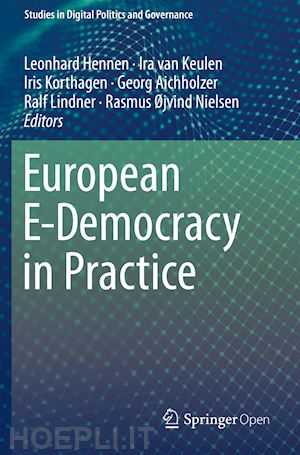
Questo prodotto usufruisce delle SPEDIZIONI GRATIS
selezionando l'opzione Corriere Veloce in fase di ordine.
Pagabile anche con Carta della cultura giovani e del merito, 18App Bonus Cultura e Carta del Docente
Leonhard Hennen, PhD. in Sociology, is a former project manager at the Office of Technology Assessment at the German Parliament, which is run by the Institute of Technology Assessment, Research Center Karlsruhe, Germany. He has been responsible for projects on Genetic Testing, Technology Controversies, Sustainable Development and Research Policy, Neuro-Science and Society, E-democracy and others. He has participated in several European projects on concepts and methods of Technology Assessment. Since 2006 he has been coordinator of the European Technology Assessment Group (ETAG). ETAG was set up by a group of European Scientific Institutes active in the field of Technology Assessments, which carry out TA studies on behalf of the European Parliament.
Ira van Keulen has been a senior researcher and parliamentary liaison at the Rathenau Institute, The Netherlands, since 2009. She specializes in digital democracy and evidence-informed politics and has beeninvolved in various projects on converging technologies and human enhancement. Van Keulen studied Sociology at the University of Groningen, The Netherlands, and at the Graduate Center of the City University of New York, USA. Her work has consistently focused on interactions between technology and society. As a liaison for the entire institute, she is responsible for ensuring that its work is communicated at the right time, and to the right parliamentarians, at the Dutch House of Representatives and the Senate.
Iris Korthagen has been working as a researcher at the Rathenau Institute, The Netherlands, since February 2015. With a focus on topics such as science journalism, digital democracy and smart cities, she has chiefly worked for the Council for Social Development (Raad voor Maatschappelijke Ontwikkeling, RMO). The advisory reports she has written for the RMO were focused on nudging and on journalism. Her PhD research examined the role of media and media logic with regard to decision-making in networks. Korthagen studied Cultural Studies (BA) and Philosophy (BA) at the Erasmus University Rotterdam, The Netherlands. After a pre-master year in Public Administration she completed her Master’s degree in Research in Public Administration and Organizational Science (MSc) at the University of Utrecht, The Netherlands. Currently she is working as a senior researcher at the Netherlands Court of Audit.
Georg Aichholzer is a sociologist and freelance collaborator with the Institute of Technology Assessment (ITA), Austrian Academy of Sciences. He has extensive research and teaching experience in technology and technology assessment, especially on electronic governance, electronic democracy, digital change and the future of work.
Ralf Lindner is a senior researcher at the Fraunhofer Institute for Systems and Innovation Research (ISI) in Karlsruhe, Germany, where he coordinates the institute’s Technology Assessment activities. He received his degree in Political Science and Economics from the University of Augsburg, Germany and completed his graduate work at the University of British Columbia (Vancouver) and post-graduate studies at Carleton University (Ottawa), Canada. His doctoral dissertation focused on the application and integration of digital networks in the communication strategies of intermediary organizations. For more than a decade, he has been working on numerous research projects investigating the political and societal impacts of ICT. In addition to his research in the area of new media and society, Lindner has specialized in the analysis of science, technology and innovation policy and governance.
Rasmus Øjvind Nielsen has an MA in Philosophy from University of Copenhagen and is currently a PhD candidate in Public Administration from the Roskilde School of Governance in collaboration with the DBT, where he serves as a project manager. He specialisesin institutional analysis and issues regarding the conditions for policy development and public engagement. He has been involved in the development of the GlobalSay platform for online democratic debate and previously participated in the development of the World Wide Views methodology for ICT-mediated multi-site public deliberation.











Il sito utilizza cookie ed altri strumenti di tracciamento che raccolgono informazioni dal dispositivo dell’utente. Oltre ai cookie tecnici ed analitici aggregati, strettamente necessari per il funzionamento di questo sito web, previo consenso dell’utente possono essere installati cookie di profilazione e marketing e cookie dei social media. Cliccando su “Accetto tutti i cookie” saranno attivate tutte le categorie di cookie. Per accettare solo deterninate categorie di cookie, cliccare invece su “Impostazioni cookie”. Chiudendo il banner o continuando a navigare saranno installati solo cookie tecnici. Per maggiori dettagli, consultare la Cookie Policy.